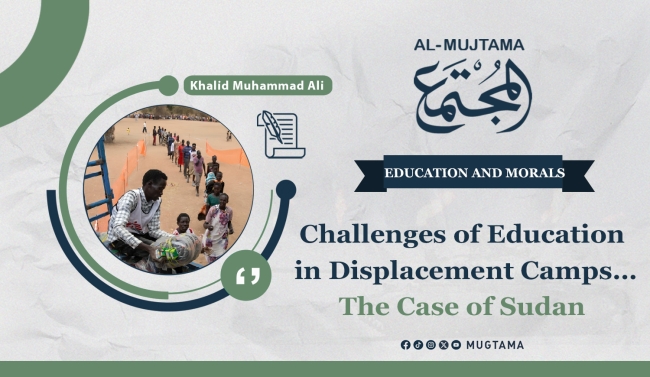Challenges of Education in Displacement Camps… The Case of Sudan
The ongoing civil war in Sudan has left devastating effects on families and society across all aspects of life, particularly education, which serves as a cornerstone for nurturing children, youth, and future generations through moral and academic frameworks typically chosen during times of stability and development.
In third-world countries, education holds paramount importance in steering society toward achieving its goals, as the family, educational, and religious systems play pivotal and influential roles in the upbringing process.
The displacement and disintegration caused by the war have torn apart Sudanese families, separating fathers from their families, teachers from their students, and preachers from their followers. This has significantly hindered Sudanese society's ability to achieve its educational objectives for children and youth. Many of these children often leave displacement camps to seek relief supplies, scraps of food, low-paying jobs, or even enlist in militias for sustenance and survival.
Conditions in Displacement Camps
According to the International Organization for Migration, the number of displaced persons in Sudan reached 14 million by the end of 2024. A smaller portion of this population resides in displacement camps spread across various Sudanese states, while the majority have found refuge with families, tribes, and Sufi orders—a testament to the solidarity and cooperation characterizing the Sudanese people during crises. Since the war's outbreak on April 15, 2023, there has been a popular mobilization in safe areas to host displaced individuals, sharing the limited resources left by the war. However, for reasons yet unknown, international organizations have failed to establish sufficient camps to accommodate this massive number, amounting to nearly one-third of Sudan’s population.
Several camps, such as those in Al-Damazin, which house over 100,000 displaced individuals from the Blue Nile region, have gained notoriety for their challenges and difficulties. Similarly, the Abu Shouk camp in Darfur is rife with disputes between the Sudanese army and the Rapid Support Forces over its control. The Zamzam camp in North Darfur, now overcrowded with over half a million displaced persons, mirrors these dire conditions.
The "Kalma" camp in South Darfur, under the control of the Rapid Support Forces, stands out as one of the worst places for displaced individuals. It suffers from food shortages, a complete collapse of educational systems, and a lack of life-saving medicines and healthcare. Reports of deaths due to the unavailability of essential medications are common, and these conditions are mirrored in displacement camps throughout Sudan.
Educational Challenges
The harsh realities of displacement camps in Sudan have become a significant obstacle to education at all levels—academic, ethical, and cultural. Displaced individuals face challenges in meeting their basic health, educational, and nutritional needs and are often cut off from educators, religious leaders, and community mentors. These obstacles severely hinder the ability of both the state and Sudanese families to fulfill their educational responsibilities.
Education, being a fundamental component of upbringing, faces severe disruption due to the lack of schools, teachers, and basic educational tools. In displacement camps across Chad and areas controlled by the Rapid Support Forces, students were unable to sit for their 2024 exams. Media reports highlighted mutual accusations between the army and the Rapid Support Forces regarding the failure to conduct these exams.
Testimonials from educators and displaced persons reveal acute shortages in resources and infrastructure. Classes are often held in dilapidated tents or under trees, with students sitting on stones and sharing a single textbook held by the teacher. This has made completing the academic year extremely challenging.
According to UNICEF, dropout rates in Sudan are alarmingly high due to the absence of structured curricula and qualified teachers. Additionally, the lack of electricity and teaching materials deprives children of quality education, jeopardizing their future and pushing them toward early employment or hazardous activities.
As for formal education, children face difficulties in taking exams due to the lack of suitable facilities and the deteriorating psychological and social conditions. Additionally, traveling to exam centers in cities or other areas poses a challenge due to the distances between displacement camps and safe areas, the lack of security, and the absence of transportation means, which negatively impacted their academic outcomes throughout the year.
Broader Issues
The challenges in displacement camps extend beyond education. Children lack a healthy social environment due to the absence of social workers, parents, and teachers who would typically guide and mentor them. This has led to increased aggressive behaviors and the disintegration of family ties. Poor health facilities and the spread of diseases like cholera and malaria exacerbate their suffering, as malnutrition and dire environmental conditions heighten the risks of illness and death.
Psychologically, children face repeated trauma from the ongoing war, resulting in deep-seated issues such as depression and post-traumatic stress disorder. Crimes such as theft and violence are rampant in the camps, creating an atmosphere of fear and insecurity that hinders the educational process.
Despite these overwhelming challenges, hope remains for saving education in these camps. The Sudanese government, in collaboration with international organizations like UNICEF, has launched initiatives to rehabilitate damaged schools and provide temporary classrooms in camps to ensure the continuity of education under harsh conditions.
Volunteers, including teachers, have also stepped in, offering free lessons to children and helping to sustain the educational process to some extent. International initiatives such as the United Nations’ "Education Cannot Wait" program aim to support children affected by humanitarian crises by building mobile schools and supplying curricula and educational materials.
-------------------------------------------------------------


